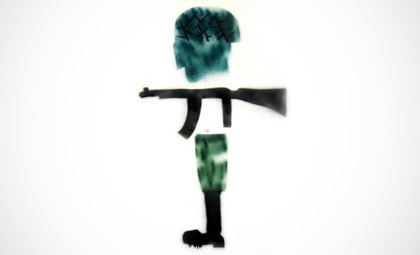
In an elaborate spectacle, the Lebanese have nurtured an aesthetic for partitioning neighborhoods along sectarian lines with gang-like semiotics. Posters, graffiti, flags and color schemes all serve as a pervasive reminder of what AUB sociologist Samir Khalaf calls the “seold_parate, exclusive and self-sufficient spaces” that evolved during the civil war, and that are now coded into everyday life. Today, barely a wall in Beirut is left untouched by some form of iconography, be it political propaganda, low-budget event promotion or rebellious street art.
There is no law against spray painting graffiti in Lebanon. But on February 11, Lebanese painter and poet Semaan Khawam was charged with disrupting public order after police saw him spray-painting an image of an army soldier holding a gun on a Gemmayzeh neighborhood wall.
Oras also says he wouldn’t have picked that particular location. “Lebanese graffiti artists have ethics. We respect private property. We don’t go to a clean wall and do graffiti on it... Gemmayzeh is clean for me. It’s not a place to do graffiti, in my opinion.”
Khawam is set to defend himself in front of a judge on Wednesday. Ayman Mhanna, executive director of the Samir Kassir (SKeyes) Center for Media and Cultural Freedom, which is giving the artist legal counsel, argues, “we understand that theoretically we cannot destroy public property, but we know that the walls of Beirut are quite ugly, so having nice drawings and graffiti on them is not something that’s degrading public property, it’s adding value to public property. And there is so much graffiti on public walls, it’s totally ridiculous to pick on this guy specifically and prosecute him.”
Mohammad, who along with his twin brother Omar make up the Lebanese hip hop duo Ashekman, takes a bold position on the graffiti debate. “The government and Beirut municipality should pay us because we’re doing something good for the city, making it a nice place to look at when you walk by.” “I don’t know [Semaan] but I’m sympathetic with what’s happening to the guy,” he says.
“For Ashekman, graffiti is guerilla marketing in the form of free speech. We put up our thoughts without censorship. We say, ‘this is my city, this is my turf, my playground.’ So of course I’m against this charge [faced by Khawam].”
According to Oras, who says it takes at least 4 to 5 hours to paint a piece of graffiti, encountering police is common and expected, but authorities often have varied reactions to what they’re doing.
During one incident when the crew was spray painting under a bridge in Karantina, Oras says the mukhabarat, or secret police, arrived and briefly questioned them. Later, the police stopped by and did the same. Finally, some members of the army approached. After a brief conversation, the army member instructed: “Finish your thing. I didn’t see you. Go quickly.”
Mohammad recalls a time when he and his brother were painting graffiti near Ashrafieh. Police stopped and asked for their names and the officer responded, “My son has your [music] album!” and let them continue working.
“The process is so ridiculously scattered with absolutely no sign of any good process or communication or due diligence between the various security and judicial apold_paratuses,” Mhanna laments. “This is what’s really sad. Nobody really knows where to head or who to call because everything is so disconnected within the state institutions.”
Recently, the boys from Ashekman have come up with a resourceful way to avoid trouble with police. Mohammad and Omar will go to one of the many parking lots in Beirut with a wall surrounding it and pay the parking attendant 50,000 LL to paint it. “I tell the guy it’s not political or social and he usually agrees. It’s a clever way to avoid being harassed,” Mohammad says.
As for Khawam, he says he’ll continue doing more graffiti. “For me the street is where the people can say their words and raise their voice. It’s always where they can speak. I’m not going to stop.”
Some activists are calling for a protest in solidarity with Khawam during his hearing in front of the Court of Justice on April 4 at 10 a.m. For more information, click here.